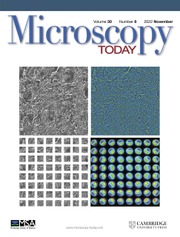No CrossRef data available.
Article contents
Need For Education, Not Just Training
Published online by Cambridge University Press: 14 March 2018
Extract
Microscopy is unique among its analytical counterparts: it requires a hand-eye-brain coordination not needed in any other type of analytical instrumentation. On one hand, manufacturers of microscopes and auxiliary technologies are working to make systems seamless, transparent, and easier to use. On the other hand, microscopists, even those who will use the microscope as routine tools, need to be knowledgeable in their core disciplines as well as fluent in microscopy and sample preparation. It is not enough that a the person running a microscope be trained to "push this button; turn this knob". Especially as we move into the next millennium, it will become increasingly important to understand the light/matter, electron/matter, or probe/matter interactions which occur when examining a specimen. Microscopists of all descriptions will need to know how to optimize both the sample and the technology, how to interpret the information presented by the image, and how to separate artifact from true information. To compound the problem, the convergence of computer, diverse software packages, microscope, camera, and analytical techniques is producing a new type of multiple level information which, in turn, requires expertise in multiple disciplines.
- Type
- Research Article
- Information
- Copyright
- Copyright © Microscopy Society of America 1999




